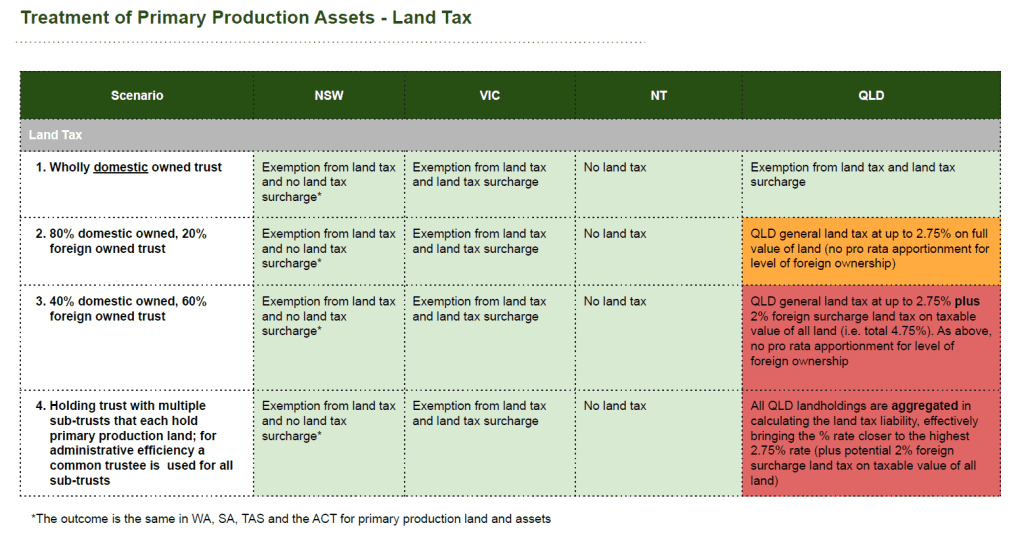WITH less than three weeks remaining until Queensland’s state election, neither side of politics has shown any inclination to commit to dropping the state’s controversial and punitive foreign land tax.
Neither Labor, nor the Liberal-National Party, which is being tipped to wrest power from the ALP after nine years in government on October 26, have shown any real interest in the topic, despite considerable lobbying from ag sector interests over the past six months.
State LNP leader David Crisafulli spoke during a recent Queensland Rural Press Club event in Brisbane, but while time did not allow direct questions to be raised about the Opposition’s future intentions for the land tax, private discussions between property industry stakeholders and Mr Crisafulli during the event gave no indication that the LNP has any plans for change.
Generous election promises from both major parties have been daily occurrences since the state election was announced a week ago, but winding back any established tax is always regarded as an unlikely outcome, for financial reasons – especially with the Queensland budget position in less than healthy shape, a property identity suggested.
Queensland’s Land Tax on Freehold land (details set out in the table below) was originally struck as a means of discouraging offshore investors buying residential and holiday real estate and simply locking the buildings up, it has had unintended and significant consequences in the rural property market.
“And it’s not just investment in agriculture that’s being discouraged,” a prominent ag property marketing told the Opposition leader during the recent Press Club gathering.“Brisbane is an Olympic city, lining up to host the 2032 Games, and the tax is chasing foreign capital away from investing in accommodation, hotels and other infrastructure that will be desperately needed in eight years’ time,” he said.
“The real point is that 95 out of 100 rural property sales in this state do not involve foreign capital – they are family investors – and with the exception of some Central Queensland buffel grass country, it’s pretty tough out there,” he said.
“If you halve the pool of bidders in a sale process by taking foreign capital off the table through excessive tax, then it has to impact on value. A big unseen impact of the tax is in the level of competition on property.”
It’s been suggested in property circles that the financial burden of the foreign land tax was a key driver in the recent decision by Chinese interests to sell their extensive St George district cattle and cropping assets in Queensland.
The Sydney-based, Chinese-owned Hailiang Australian Land Investment Co is offloading adjoining cattle and cropping assets Hollymount and Mt Driven, 61,007ha south-east of St George, after ten years of ownership. Expressions of interest closed at the end of August, but no result has yet been announced.
So how much revenue does the Queensland Government make from the foreign land tax?
The figure is apparently not disclosed in Treasury reporting, but some say an estimate could be ‘reverse engineered’ through publicly accessible data held in Queensland’s Foreign Ownership of Land register – the longest running such register in the nation, which has functioned since the early 1990s.
Queensland the outlier

Tim McGavin, Laguna Bay
Tim McGavin, managing director of Rural land asset manager Laguna Bay, has been a vigorous recent lobbyist over the issue of foreign land tax on investment in Queensland agricultural land.
“As a ‘foreign’ landowner in Queensland, we are subject to an annual 4.75pc land tax impost (including a 2pc surcharge), which resident owners are not,” he wrote in a recent letter to Queensland Treasurer and Trade and Investment minister Cameron Dick, and Agriculture Minister Mark Furner.
“Queensland is an outlier in this respect, with no other states imposing a foreign surcharge on land tax on primary production land,” he said.
Mr Gavin said the foreign land tax surcharge disproportionately impacted agriculture investment due to agriculture’s large unimproved land exposure, as opposed to foreign owned commercial or residential real estate investments with their lower proportion of unimproved land.
“Any land tax exemptions which may be available will only be granted on a case-by-case basis after a very lengthy application process. In addition, they must be re-applied for annually. This creates significant uncertainty and regulatory burden, whereas automatic exemptions exist for primary production freehold land in other states,” he said.
“Land tax and other policy settings are impacting the ability of Queensland investments to generate positive cash flow. This is putting us in a position of rethinking our Queensland investments. Our strong preference is to remain invested in Queensland, but we need certainty surrounding land tax,” Mr Gavin said.
Massive impact
Speaking with Beef Central’s Weekly Grill podcast host Kerry Lonergan in this recent podcast episode , property marketing identity Danny Thomas from LAWD described Queensland’s land tax on foreign investors as one of the most ludicrous things he had ever seen in the field of government revenue raising.
 “It’s having a massive impact on the rural property sector,” Mr Thomas said.
“It’s having a massive impact on the rural property sector,” Mr Thomas said.
“Queensland is the only state in Australia that levies a land tax on agricultural land. Queensland, like other governments, has been encouraging investors of all types – including offshore entities as part of investment forums held overseas – to come and invest in the state.
“More than any other state in the country, Queensland is blessed with abundant natural resources and climate for cattle production, and is calling out for new investment to develop that.”
“If I can speak candidly, it’s mind-numbingly stupid, that the government would seek to tax those properties at the same time as they are trying to encourage investment. Whether they intended to or not, what they have actually done is discourage some billions of dollars of investment in land in Queensland which is currently for sale, because of this tax.”
While the tax was originally targeted at deterring residential type foreign investments in Queensland that would be simply locked up, Mr Thomas said what that had to do with investment in agriculture had ‘gone straight past him.’
“It needs to be urgently and seriously looked at, if the great state of Queensland wants to attract some of this overseas investment money to further develop agricultural landholdings,” he said.
“Otherwise it heads into southern states, or agriculture elsewhere overseas.”


